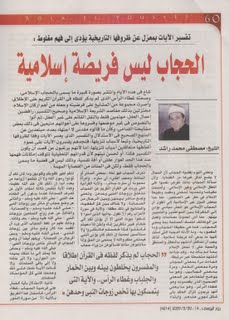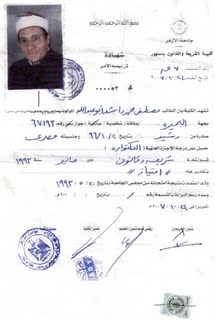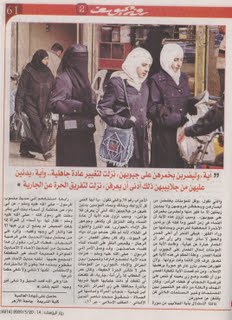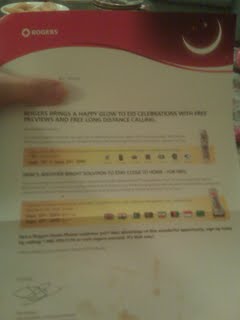On the first evening of Ramadan, I broke fast with approximately 14 others. Last night, nine of us broke fast together, and tonight there will be anywhere between eight to ten of us breaking fast in the same home. I’d never reflected on this before until I thought of sharing this event. There is something deeply moving about the experience and I’m only just starting to make the greater connections. Please consider this entry a tentative start on the matter.
Within the Quran rests utter indivisibility between faith and good works. (This is a critical point in Islam, and it differentiates religion from secular humanism.) To grow within Islam, one must nurture and develop
both of these aspects within the self. It is perhaps during this most important month for Muslims that one can see the reality of this. Were you to walk through the streets of any Muslim country, you would be met with the following…
Homes have in their front yards placed tables and tables of food, doors opened for anyone who wishes to step in and break fast at that location. There are no questions asked and no fees imposed; no one cares if you are fasting, no one knows how much money you have in your pocket, or what your name is and no one asks if you’re Muslim.
At all mosques the world over, local Muslim families donate food and drink (or money to this end) to feed those who choose to break fast in the mosque. Although this takes place in all mosques across the globe, it is perhaps in Saudi Arabia felt most profoundly because of the sheer numbers involved. At 'Masjid Al-Haram' - where the Kabaa is located – nightly, at least one million Muslims break fast
together in the Masjid over dates and milk, then pray maghrib (the 4th prayer of the day)
together before they sit
together to chat, ending their time
together praying isha (the 5th and final prayer of the day).
This serves as only one example of the message of unity
in community repeated and so deeply rooted within the message of Islam.
Precisely because we’re not here discussing secular humanism, this then must go hand in hand with faith. For Muslims, this ‘unity’ is the reflection of God Himself. From Him everything comes and to Him everything returns. Every. Single. Thing.(1)
This unity may be better expressed as the 'Oneness' of God, within which rests a deeper message for those interested in hearing and reflecting: the Oneness of humankind. Malcolm X’s penetrating gaze saw and articulated it best: ”During the past eleven days here in the Muslim world, I have eaten from the same plate, drunk from the same glass and slept on the same rug -- while praying to the same God -- with fellow Muslims, whose eyes were the bluest of blue, whose hair was the blondest of blond, and whose skin was the whitest of white. And in the words and in the actions and in the deeds of the white Muslims, I felt the same sincerity that I felt among the black African Muslims of Nigeria, Sudan and Ghana."
"We were truly all the same (brothers) -- because their belief in one God had removed the white from their minds, the white from their behavior, and the white from their attitude."
"I could see from this that perhaps if white Americans could accept the Oneness of God, then perhaps too, they could accept in reality the Oneness of Man -- and cease to measure, and hinder, and harm others in terms of their differences in color."
As already mentioned, within the Quran rests the
utter indivisibility between faith and good works. Further to this, and important to Muslims (of no consequence to those who are not) is that ”faith should inspire righteous deeds, which, in turn, should nurture a more profound experience of faith, which should incline one to greater acts of goodness, and so on, with each a function of the other, rising in a continuous increase.” (
Even Angels Ask, Jeffrey Lang, 35-37.)
As Lang goes on to describe, following are some examples of universally recognized virtuous acts:
Showing compassion. (2:83; 2:215; 69:34)
Being merciful. (90:17)
Forgiving others. (42:37; 45:14; 64:14)
Being just. (4:58; 6:152; 16:90)
Protecting the weak. (4:127; 6:152)
Defending the oppressed. (4:75)
Acknowledging wisdom. (20:114; 22:54)
Being generous. (2:177; 23:60; 30:39)
Being truthful. (3:17; 33:24; 33:35; 49:15)
Being kind. (4:36)
Being peaceful. (8:61; 25:63; 47:35)
Loving others. (19:86)
The one glaringly obvious link between all of them is that in order for us to commit them and grow in virtue, we must bind ourselves - via these acts -
to others. Our own sense of self is directly linked to humankind. For a Muslim, humankind is further linked to God. (As stated earlier: Within the Oneness of Him is the Oneness of humanity.)
To understand this more deeply, extend this example to the famed Sufi perspective on love: one does not truly love until they call to their other by calling to themselves. Essentially, one does not experience the fullness of love until one can see through the eyes of their lover and vice versa. Taken further, that means bringing into one’s own heart the pain and happiness and struggles of their partner. Experiencing love as the Oneness of the two, may be the fullest and deepest way to experience the love shared. No doubt challenging, but the rewards one-thousand fold gratifying.
For those who believe, raise your stakes this month and keep the above list with you – remind yourself to be patient and to make your heart bigger. Do it for yourself, for your faith, and for your community. The bigger your heart, the warmer your community, the better you will be. Always remember that your relationship to God is empowered and strengthened by your relationship with humanity, and vice versa.
To those who don’t believe, do the same, only for the sake of your brothers and sisters in humanity. Whether or not you believe that God exists, you can not deny that community remains…and community is a reflection of you. Render it healthy and find relief within the space you’ve nurtured.
Aside: In the next few entries, I’ll do my best to discuss the five pillars of Islam and the way each is both inward looking (intended to improve the individual) and outward looking (intended to improve the community). Naturally, to improve oneself offers a direct impact on the improvement of community.
*****************************************
(1) So then the obvious question becomes: Why not cut out the middle-man (God)? As with everything, this is an option, obviously. But, for Muslims, the ‘middle-man’ is an inherent part of the equation. I’ll try my best to articulate how Muslims view this particular circumstance:
(a) One has the choice to either
Believe in the existence of God, thereby entering into a relationship with Him
Or
Not believe in His existence, thereby
not engaging in that relationship.
(b) As a Muslim, you believe that God exists.
(c) This very belief naturally turns you towards God and makes you party to a relationship
with God.
(d) The relationship with God is strengthened by your relationship with humankind, and vice versa.
Whereas a secular humanist would erase God from the above equation, a Muslim chooses to engage in that relationship instead.
The following example will make sense more to a Believer than a non-Believer because it presupposes the existence of God, but I’ll throw it out there anyway: An analogy to the relationship between wo/man and God is the relationship between child and parent.
That both child and parent
are, doesn’t necessitate an engaged (if any) relationship. For the relationship to be it’s most successful, both parent and child need to face one another, embrace one another and live out the fullness and potential of the love shared and found within that relationship.
Muslims – at least my understanding of Islam and how I try to live my life – perceive the relationship between themselves and God as precisely this sort of a relationship. Furthermore, Muslims believe that God is
always facing each individual, but the choice to reciprocate that rests solely with the individual in question. And as the Quran clearly states, there is no coercion in religion and so the movement to face God and enter into that relationship is one that must be done entirely by the freedom of choice possessed by the individuals themselves (and in fact, interestingly enough: the Quran indicates that most of humankind will turn away from this very relationship).
Labels: Faith

















